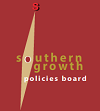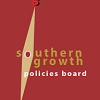
SGPB annual meeting focused on workforce of the future
 The formal presentations and the conversations in the halls at The Chattanoogan hotel in Chattanooga last week were focused on strategies to prepare a competitive workforce for the future.
The formal presentations and the conversations in the halls at The Chattanoogan hotel in Chattanooga last week were focused on strategies to prepare a competitive workforce for the future.
The occasion was the annual meeting of the Southern Growth Policies Board (SGPB). It was hosted by Tennessee Governor Bill Haslam who is the current Chair of SGPB.
Two of the keynote speakers were Jamie Merisotis, President and Chief Executive Officer (CEO) of the Lumina Foundation, and Marc Tucker, President and CEO of the National Center on Education and the Economy.
In kicking-off the event, Haslam told the crowd of about 150 that there is “no more critical issue facing us as a state . . . than workforce development.” He praised the work of his predecessor, former Governor Phil Bredesen, particularly the “Race to the Top” initiative.
Saying that one of Tennessee’s challenges is to keep the momentum going., Haslam added, “We still have a ways to go. We are not producing the high quality that we need.”
The speakers and panelists that followed addressed the overall conference theme of “Re-imagining Workforce Development” through a variety of lenses including future workforce needs, competing internationally, and use of data to drive decision-making.
No speaker was more provocative than Tucker who clearly intended to stimulate discussion.
“We spend more (on education) and get less than any other country,” he said, noting that the top education reform strategies that America has adopted are not being used in the other countries that are realizing significant gains in educational attainment.
While the U.S. is focused on increased funding, smaller class sizes and performance pay for teachers, Tucker said other countries have focused on a different set of priorities that he argued are producing significant results. One example among many that he cited was the fact that these countries allocated more funding per pupil to students who are harder to educate.
Tucker also said that school systems in the U.S. are asking, “How can we get rid of our worst teachers?” He said that the more appropriate question should be, “How can we replace them with better teachers?”
He concluded that “it might make sense to change horses” if the approaches of other countries is producing better results than those of the systems in the states.
Prior to Tucker’s presentation, Merisotis delivered an equally sobering but more traditional presentation.
“It’s not about politics but about progress . . . our future as a nation,” he said of the dialogue. “The key to the nation’s long-term economic success is a 21st century workforce.”
As far as the South, Merisotis said that 56 percent of all new jobs will require post-secondary qualifications. He expects 10 million vacancies to be filled in the next six years.
“Today’s post-secondary system cannot get us where we need to be,” he said. “What we’ve always done just isn’t working anymore.”
While not as provocative as Tucker, Merisotis did address one of the biggest education issues – its cost.
“The challenge is huge – maintain or improve the quality of graduates, graduate more and do it with constrained resources,” he said. As far as continually rising tuition and public funding, Merisotis said, “Neither government nor students can afford these continuing costs.”
“The key is driving down the cost side and focus on improving the price side,” he advocated.
In addition to the focus on workforce over the one and one-half day event, SGPB also took time at its annual banquet to celebrate the organization 40th anniversary. Four luminaries from SGPB’s past reflected on the history. They were former Mississippi Governor William Winter, Chair of SGPB’s widely-recognized 1986 “Commission on the Future of the South”; David Mathews, President and CEO of the Kettering Foundation; Stu Rosenfeld, a consultant and former Director of SGPB’s Southern Technology Council; and Jesse White, a former SGPB Executive Director who later became Federal Co-Chair of the Appalachian Regional Commission.
Like what you've read?
Forward to a friend!

